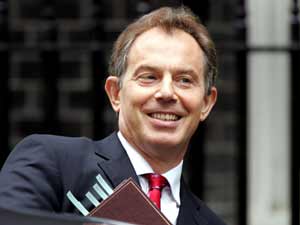Blair is back in big politics again
Who is the real winner?

Everyone can claim victory in the British legislative election because the opposition parties increased their number of MPs while Labour won another massive absolute majority.
However, the real winner in this election is the Prime Minister, Tony Blair. Those who opposed him tried to hit what they perceived as his weak point but at the end of the day, what matters to the British electorate, is questions which affect their daily lives directly, however much disagreement there was about the casus belli in Iraq.
The return of Tony Blair to power is a personal vindication of his status as the leader of the country but more importantly, is a clear vote in favour of his domestic policies, given that such an uproar was caused over Iraq that this type of event will not happen again, at least in the near future.
Recognising that the war had been “deeply divisive”, the British Prime Minister considers that the election result is a sign by the British people that they want to move on.
With 355 seats, Tony Blair's Labour has an overall majority of 68 seats, having lost 47 since 2001. The Conservative Party, led by Michael Howard, improved by 33 seats (winning 36 and losing 3), while Charles Kennedy's Liberal Democrats made an overall gain of 11 seats (winning 16 and losing).
The other parties (Welsh and Scottish Nationalists, Ulster parties and three independent seats, including George Galloway's Respect, an anti-war stance) gained 28 seats in total. Despite the improvement, the Conservatives and Liberal Democrats came a long way from making the inroads they had intended. Michael Howard has already declared that he is stepping down for the party to choose a younger leader, while Charles Kennedy should continue to lead the LibDems, having built on the success of Paddy Ashdown in taking the party from political oblivion to creating a viable third alternative.
The net result is a British people who believe that Labour is the party which stands for investment in public services and is better placed than the opposition parties to fight crime, create jobs, keep unemployment low, fight anti-social behaviour, and to improve hospitals, schools and public transportation. 18 years of insufficient investment in public services under Thatcher and Major left a bitter taste among the British electorate, explaining a third successive defeat for the Conservatives and a historic third successive victory for Labour. As for the LibDems, this party suffers from the electoral system, which favours a first past the post selection process (the country is divided into 645 constituencies, each of which elects one member of parliament). The LibDems tend to come in second place in many of the constituencies they did not win outright and so many votes are not represented in Parliament.
Tony Blair declared that he has listened and learned during the last few weeks and that "I think I have a very clear idea of what the British people now expect from this government for a third term.” He promised a radical programme to “bring back respect in our schools, in our communities, in our towns, in our villages." The Kremlin issued the following statement on the re-election of Tony Blair: Vladimir Putin warmly congratulated Tony Blair on the occasion of his birthday and the victory of the Labour party that he leads in the parliamentary elections.
Subscribe to Pravda.Ru Telegram channel, Facebook, RSS!


